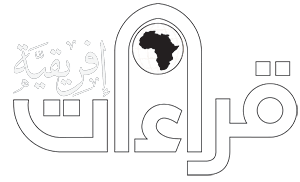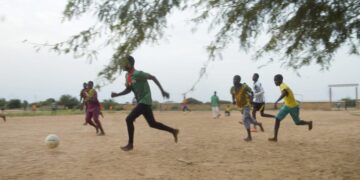Abstract: The Coptic Church currently answers its calling in Africa through seven Church Fathers and Bishops, together with a large number of priests, monks, consecrated persons and laypersons. The Fathers are: his eminence Bishop Pachomius, Bishop of al-Buhaira, Matrouh and North Africa; his eminence Anba Anthony Murcos, Bishop of South Africa who was appointed and promoted to Archbishop in June 19; his eminence Anba Srabamon, Bishop of Atbara, Omdurman and North Sudan; his eminence Anba Elia, Bishop of Khartoum and South Sudan; his eminence Anba Paul, General Bishop of Preaching in Africa; his eminence Anba Josef, the seventh General Bishop of Africa, who was ordained last March to serve four southern African countries; and his eminence Anba Biman, Bishop of Naqadah Wakous and Coordinator of Relations with the Ethiopian Orthodox Church. The services of the Coptic Church expand and grow in Africa day by day, not only in the spiritual sphere, but also in the developmental, educational and healthcare spheres. These are in addition to other services supervised by the pious Father David Lamei. First: Capabilities of the Coptic Church to Work and Serve in Africa Many factors and causes come together to guarantee, whether at present or in the future, that the Coptic Church plays its diverse role in the African continent in a greater, more widespread and influential manner commensurate with the capabilities of the Church and its internal and external determinants, to serve and complement, ultimately, the role of Egypt, itself, in Africa. The Coptic Church is distinguished by not having a colonial past, and thus it possesses a spotless historical record for work in Africa. In addition, it is a national church whose thinking is compatible with African ways of thinking, especially in regard to theology. Its missionary thinking also coincides with the conditions of the African continent and the requirements of its work there. The Church works on educating people in the continent, preparing them religiously and socially in a most “professional” manner. Moreover, its work and efforts are well received by the African countries and their people. Second: Map of Coptic Churches in Africa (Whereabouts and Influence) 1-The study reviews the level of the Church's relationship with the respective African countries themselves: A - The Coptic Church relationship with North Africa, or the five western cities (now Libya), the relationship with Sudan (formerly Nubia), and the relationship with Southern Sudan. B- The Coptic Church relationship with East Africa: We review the historical roots of the relationship with Ethiopia and relations with Eritrea, and then the current framework of the relationship with the Ethiopian and Eritrean churches. There is also the relationship of the Coptic Church with Kenya, Tanzania and Uganda. C- The Coptic Church relationship with the countries of Central Africa: the relationship with Zaire (Democratic Republic of the Congo). D- The relationship of the Coptic Church with South Africa: Especially after the formation of the new Coptic Parish in South Africa in June 2019. The relationship with other Southern Africa countries "Zambia, Zimbabwe, Namibia, Swaziland". E- The relationship of the Coptic Church with West African countries: (Nigeria - Ghana - Cameroon - Ivory Coast – Togo) 2- The relationship of the Coptic Church with African organizations. Third: Dimensions of the Role of the Coptic Church in Africa: The role of the Coptic Church in Africa has many dimensions, and it combines a political role with a social "developmental" one, in addition to religious or cultural and educational roles. Through each of these roles the axes of influence of the Coptic Church extend in more than one direction on the continent, whether towards resisting colonialism, reinvigorating African nationalism, combating slavery and racial segregation or towards establishing developmental institutions in African countries like hospitals, clinics, or vocational training centers for women and men alike, as well as nurseries, and in caring for children in general. The Church furthermore touches on the elements of the "religious" and educational or cultural influence, represented in either translation work or by transferring the idea of Sunday schools to the African continent, or by the establishment of both religious and civil educational institutions, in which the Coptic Church has been in the forefront, especially in Ethiopia and Sudan. The Coptic Church therefore provides no fewer or less important services to Africans than those that used to be provided by western churches on the continent, and additionally, the Coptic Church excels in originality of approach and fostering a strong sense of belonging. Vision of the Role of Coptic Church in Africa: Many factors and causes collaborate to guarantee, whether at present or in the future, that the Coptic Church plays its diverse role on the African continent in a greater, more widespread and influential manner commensurate with the capabilities of the Church. And if the Coptic Church has already set out to work in all parts of the continent, whether ecclesiastically or institutionally, and the new younger generations are taking the same line and mastering foreign and African languages, as well as learning more about the conditions of African countries. Thus, the Saint Paul School for Preaching and Service was established and supported by Coptic teachers specializing in all fields. The work of the Coptic Church now represents modernity in Africa and has currently extended to more than "thirty-three" African countries, which means a rise in the role of Egypt generally and Egypt's growing capacity to work and compete positively in Africa.
الملخص: تخدم الكنيسة القبطية حاليا في أفريقيا من خلال سبعة من الآباء المطارنة والأساقفة، مع عدد كبير من الآباء الكهنة والرهبان والمكرسين والعلمانيين ، والآباء هم: نيافة الأنبا باخوميوس مطران البحيرة ومطروح وشمال أفريقيا، نيافة الأنبا أنطونيوس مرقس مطران جنوب أفريقيا وقد تم تجليسه وترقيته مطرانًا في شهر يونيو 2019، نيافة الأنبا صرابامون أسقف عطبرة وأمدرمان وشمال السودان، نيافة الأنبا إيليا أسقف الخرطوم وجنوب السودان، نيافة الأنبا بولس الأسقف العام للكرازة بأفريقيا، نيافة الأنبا/جوزيف "الأسقف العام السابع لأفريقيا ولقد تمت رسامته مؤخرا فى مارس الماضى ليخدم أربعة من بلدان الجنوب الأفريقى , ونيافة الأنبا بيمن أسقف نقاده وقوص ومنسّق العلاقات مع الكنيسة الإثيوبية الأرثوذكسية. هذا وتمتد خدمة الكنيسة القبطية في أفريقيا، والتي تنمو يومًا بعد يوم، ليس في المجال الروحي فقط، بل أيضًا في المجال التنموي والتعليمي والصحي. بجانب الخدمات الأخرى والتى يشرف علينا القمص الورع الأب داود لمعى. أولا: قدرات الكنيسة القبطية للعمل والخدمة فى أفريقيا: تتضافر العديد من العوامل و الأسباب التي تكفل للكنيسة القبطية : سواء في الوقت الحالي أو في المستقبل القيام بدورها المتنوع في القارة الإفريقية بصورة أكبر و أكثر انتشارا و تأثيرا، تتناسب مع إمكانيات و قدرات الكنيسة و محدداتها الداخلية و الخارجية، ولكي تخدم في النهاية أو في المحصلة الأخيرة الدور المصري ذاته في إفريقيا .. وتتميز الكنيسـة القبطيـة بأنها ليس لها ماضي استعماري، و سجلها ناصع البياض للعمل في إفريقيا، كما أنها كنيسة وطنية وهي تمتلك الفكر الذي يتلاءم مع الفكر الإفريقي، خاصة في النواحي اللاهوتية كما يتطابق فكرها التبشيري أيضا مع ظروف القارة الإفريقيـة و مقتضيـات العمل بها، و هي تعمل على تعليم أبناء القـارة و إعدادهم دينيا و اجتماعيـا "مهنيـا"، و من ثم فإن عملها و جهدها يجد صـدى طيب لدى الدول الإفريقية و شعوبها... ثانيا: خريطة الكنائس القبطية في إفريقيا (أماكن التواجد والنفوذ): سواء : 1-حيث تستعرض الدراسة مستوى العلاقة مع الدول الإفريقية ذاتها أ-العلاقة مع شمال إفريقيا أو الخمس مدن الغربية (ليبيا حاليا),أوالعلاقة مع السودان (بلاد النوبة سابقا),ثم علاقة الكنيسة القبطية بجنوب السودان. ب- العلاقة مع شرق إفريقيا:ونستعرض الجذور التاريخية للعلاقة مع إثيوبيا, والعلاقات مع إريتريا.ثم الإطار الحالي للعلاقة مع الكنيستين الإثيوبية والاريترية. -هناك أيضا علاقة الكنيسة القبطية مع كينيا, ومع تنزانيا,ومع أوغندا. ج- علاقة الكنيسة القبطية مع دول الوسط الإفريقي: العلاقة بزائير (جمهورية الكونغو الديمقراطية". د-علاقة الكنيسة القبطية بالجنوب الأفريقى : خاصة بعد تشكيل الايبارشية القبطية الجديدة فى جنوب أفريقيا فى يونية 2019. باقي دول الجنوب الإفريقي "زامبيا ـ زيمبابوي ـ ناميبيا ـ سوازيلاند". ه- علاقة الكنيسة القبطية مع دول غرب إفريقيا: (نيجيريا - غانا - الكاميرون – ساحل العاج – توجو) 2-وعلاقة الكنيسة القبطية مع المنظمات الأفريقية: ثالثا: أبعاد دور الكنيسة القبطية في إفريقيا: تتعدد أبعاد دور الكنيسة القبطية في إفريقيا، و هي تجمع ما بين الدور الســياسي و الدور الاجتمـاعي "التنموي" فضـلا عن الدور الديني أو الثقـافي و التعليمي، و عبر كل دور من هذه الأدوار تنطلق محاور تأثير الكنيسة القبطية في أكثر من اتجاه بالقارة ، سواء صوب مقاومة الاستعمار، و بعث القومية الإفريقية، أو مكافحة الرق و التفرقة العنصرية، أو الاتجاه نحو إقامة المؤسسات التنموية في الدول الإفريقية: كالمسـتشفيات و المراكز الطبية، أو مراكز التدريب المهني للسيدات و الرجال على السواء، فضلا عن دور الحضانة و الاهتمام بالطفل بصفة عامة… ثم التطرق نحو عناصر التأثير الثقافي "الديني" و التعليمي، و المتمثل سواء في القيام بأعمال الترجمة أو نقل فكرة مدارس الأحد إلى القارة الإفريقية، أو إنشاء المؤسسات التعليمية الدينية و المدنيـة على السـواء، و التي كان للكنيسة القبطية السبق فيها خاصة في إثيوبيا و السودان. و بذلك فإن الكنيسة القبطية تقدم خدمات للأفارقة لا تقل عن تلك الخدمات التي كانت تقوم بها الكنائس الغربية بالقارة ,بل يزيد منها الأصالة والانتماء. رؤية مستقبلية لدور الكنيسة القبطية في إفريقيا: تتضافر العديد من العوامل و الأسباب التي تكفل للكنيسة القبطية , سواء في الوقت الحالي أو في المستقبل القيام بدورها المتنوع في القارة الإفريقية بصورة أكبر و أكثر انتشارا و تأثيرا، تتناسب مع إمكانيات و قدرات الكنيسة. وإذا كانت الكنيسة القبطية قد انطلقت بالفعل للعمل فى أنحاء القارة سواء كنسيا أومؤسسيا..فإن الأجيال الجديدة الشابة تمضى على نفس الدرب,مع اجادة اللغات الأجنبية والأفريقية,وتعلم المزيد عن أوضاع الدول الأفريقية ولقد تم انشاء مدرسة"سان بوول للكرازة والخدمة ,كما بدا فى الاستعانة بالأساتذة الأقباط المتخصصين فى كافة المجالات ...ومن ثم فعمل الكنيسة القبطية بات يمثل الحداثة فى أفريقيا والممتدة حاليا لأكثر من "ثلاثة وثلاثين" دولة أفريقية، وما يعنيه هذا من تصاعد الدور المصرى وتنامى قدرته على العمل والمنافسة فى أفريقيا.







































